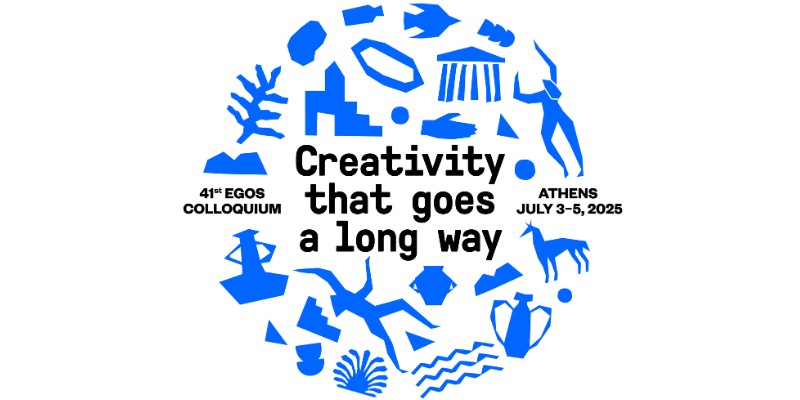Network Agency and Creativity: The Mutual Interdependence between Network Actors and Social Structures

Understanding how individuals and organizations shape—and are shaped by—their networks is a central challenge in organizational research. This call for papers invites scholars to explore the evolving interplay between agency and structure in social networks. We welcome diverse perspectives that shed light on how creative action, identity, and social dynamics emerge within and across organizational networks.
EGOS Colloquium 2025
The 41st Colloquium of the European Group for Organization Studies (EGOS) was held in Athens from July 4 to July 5, 2025. The general theme of the colloquium was “Creativity that Goes a Long Way”.

Sub-theme Program
01 Session I Network Agency: Foundations and Processes
Chair: Francesca Pallotti
01.01 A glitch in the matrix: How a low tolerance for ambiguity can lead to success in dual-reporting jobs via social networks.
Presenter: Alessandro Iorio. Authors: Alessandro Iorio, Manuel D. Gómez Solórzano and Giuseppe Soda. Discussant(s): Imran Ilya.
01.02 Exploring tensions in territorial meta-organizing through centrifugal and centripetal forces: the case of two French video game clusters.
Presenter: Camille Toussaint. Authors: Chahira Mehouachi, Thomas Paris, Camille Toussaint, and Tristan Guyon. Discussant: Arushi Aggarwal.
01.03 The agency trap: How network leverage reinforces social class disadvantages at work.
Presenter: Shelly Qi. Authors: Shelly Qi and Andy Yap. Discussants: Qi Zhang.
01.04 Exploring micro-mechanisms of the organisation of the firm.
Presenter: Anno von Heimburg. Authors: Anno von Heimburg and Jochen Runde. Discussant: Amit Kumar.
02 Session II Agency in Action: Focus on Brokering and Brokerage
Chair: Stefano Tasselli.
02.01 Brokerage behavior and shared understanding in cross-sector partnerships: An integrative review.
Presenter: Marija Meškova. Authors: Marija Meškova, Nahyun Kim, Remco Mannak and Leon Oerlemans. Discussant(s): Ivan Belik.
02.02 Brokers and brokering, the facilitator’s paradox: Building capabilities to become redundant.
Presenter: Hayley McGillivray. Authors: Hayley McGillivray, Martie-Louise Verreynne and Henri Burgers Discussant: Natalia Bagnoli.
02.03 Cross-domain brokerage and innovation: Unpacking the roles of brokerage orientation and organizational identification.
Presenter: Shihan Li. Authors: Shihan Li and Rebekah Hong Discussant: Julian Held.
03 Session III Unpacking the Connections between Agency, Creativity, and Innovation
Chair: Stefan Breet.
03.01 Mobilizing social capital in open vs. closed triads for your innovation: The role of sensitivity and political skills in idea championing
Presenter: Qi Zhang. Authors: Qi Zhang and Stefano Tasselli. Discussant: Shelly Qi.
03.02 From Me to We: Evolution of Innovation Networks in Downturns
Presenter: Amit Kumar. Authors: Amit Kumar and Elisa Operti. Discussant: Anno von Heimburg.
03.03 Groove robbers: Exploring the effects of copyright litigation on musical collaborations
Presenter: Arushi Aggarwal. Authors: Arushi Aggarwal and Elisa Operti. Discussant: Camille Toussaint.
03.04 The interorganizational network in the conglomerate and its impact on the relationship between organizational creativity and firm performance
Presenter: Imran Ilyas. Authors: Imran Ilyas and Frédéric Godart. Discussant: Alessandro Iorio.
04 Session IV Interorganizational Networks at the Boundaries between Firms, Entrepreneurs, and Innovation
Chair: Francesca Pallotti
04.01 The hidden ties: Analyzing interfirm relations in a Norwegian fintech cluster
Presenter: Ivan Belik Authors: Ivan Belik, Eirik Knudsen, Kari Sofie Mysen Conradsen, Max Hartvig-Larsen and Kari Sofie Mysen Conradsen
04.02 Dynamics of EU-funded project for research and innovation: A social network analysis of inter-organizational collaboration
Presenter: Anja Grüll. Authors: Anja Grüll and André Martinuzzi Discussant: Aafke Coopmans.
04.03 Network identity: Exploring continuity and change in a global health research network
Presenter: Hannaneh Moradi. Authors: Hannaneh Moradi, Tero Montonen and Päivi Eriksson Discussant(s): Yao Ma.
04.04 Relational effects on the clock: Exploring the influence of partner similarity on relational effect speeds
Presenter: Maksim Sitnikov. Authors: Maksim Sitnikov, Nuno Oliveira, Leon Oerlemans and Remco Mannak.
05 Session V: Leadership, Power, and Resistance as Expressions of Agency in Social Networks?
Chair: Stefano Tasselli
05.01 Changing relationship networks of repatriates – Implications for power, micro-politics and influence tactics in MNCs
Presenter: Lena Fischer. Authors: Lena Fischer, Daniel Pastuh, Jan Goldenstein and Mike Geppert. Discussant: Marija Meškova.
05.03 Networking efficiency: The effect of individual and network agency
Presenter: Yao Ma. Authors: Yao Ma, Claudia Jonczyk and Emmanuelle Fauchart.
05.04 Leadership emergence in organization: Integrating social network and social identity theory
Presenter: Alberto Monti. Authors: Alberto Monit Discussant: Hayley McGillivray.
06 Session VI Psychology and Social Capital in the Contemporary Workplace
Chair: Stefan Breet.
06.01 Redefining Bonds: Social Capital in Digitally-Mediated Work Environments
Presenter: Natalia Bagnoli. Authors: Natalia Bagnoli, Gabriele Boccoli, Luca Gastaldi and Mariano Corso. Discussant: Anja Grüll.
06.02 Staying or leaving? A mixed-methods study on the role of satisfaction, investment, alternatives and networking performance in entrepreneurial network turnover
Presenter: Julian Held. Authors: Julian Held, Claudia Jonczyk and Emmanuelle Fauchart. Discussant: Hannaneh Moradi.
06.03 Replenishing social capital: How deferring contact across weak and bridging ties mobilizes network benefits
Presenter: Thijs Velema Authors: Thijs Velema, Yang-chih Fu and Jing-Shiang Hwang Discussant: Maksim Sitnikov.
07 Session VII A Contextual Approach to Agency, Networks, and Outcomes within and across Organizations
Chair: Francesca Pallotti
07.01 Organizational boundaries and how to span them during the development, evaluation and implementation of eHealth
Presenter: Alberto Monti. Authors: Aafke Coopmans, Anna Braspenning, Remco S. Mannak, Eveline Wouters and Inge Bongers. Discussant: Alberto Monti.
07.02 Award & Wrap-up
Julian Held received the Andreas Al-Laham Best Paper Award for his paper entitled Staying or leaving? A mixed methods study on behavioural and subjective drivers of entrepreneurial network turnover co-authored with Claudia Jonczyk and Emmanuelle Fauchart.
Sub-theme Call for Papers
Organizational research is pervaded by tension on network agency. Networks and agency are the apparent poles of an oxymoron, in which the network identifies the set of nodes and ties that form social structure, enabling and/or constraining network participants’ (individuals, teams, organizations) choices and actions, and agency represents the extent to which actors forge, reproduce and shape macro-level (inter)organizational and social structures (Tasselli & Kilduff, 2021).
Despite the burgeoning interest in this topic, which is signalled by the increasing number of empirical (e.g., Quintane & Carnabuci; Soda et al., 2018; Tasselli & Kilduff, 2018) and review papers (e.g., Burt et al., 2013; Chen et al., 2022; Halevy et al., 2019; Ahuja et al., 2011), symposia and special issues published by leading journals in the field, there is no doubt that the study of the nuanced still contradictory connections between network participants’ action and structure deserves deeper and richer attention. On the one hand, it is now universally accepted by organizational researchers that networks are social canvases that either favour or hamper network participants’ action, but it is at the level of network actors, with their idiosyncratic attributes and behaviours, that social action originates and then diffuses in and throughout the network (e.g., Kleinbaum et al., 2015; Pallotti et al., 2023; Tasselli & Sancino, 2023). This is particularly evident when creative individual action introduces an unexpected change in the structure of the social canvas sustained by organizational social networks (Perry-Smith & Mannucci, 2017).
However, although the tension concerning agency has been prescient in social network theory and research since its very beginnings (e.g., Moreno, 1941), it has gained popularity (only) recently. Therefore, several important questions remain unanswered. These questions are both theoretically and empirically relevant and represent illustrative (although non-exhaustive) examples of the core topics that we expect to present and discuss in the proposed sub-theme.
How does networking happen? (i.e., through which processes and behaviours do actors come to occupy those structural positions that explain personal advantage and organizational effectiveness?)
How do actors change their current structural network position through innovation and creative action, and how does individual creativity diffuse, persist, and becomes a team or (inter) organizational feature?
What are the coevolutionary patterns through which individual actors and social networks mutually define each other in a dynamic process of structuration and reciprocal influence?
How do social networks shape individual identities and personalities, in a structuration approach to agency that implicitly calls for a parallel, ideographic approach to networking?
The aim of this sub-theme is to attract and involve a diverse and rich group of young and experienced researchers in an interactive set of presentations and discussions of these and other relevant questions and debates concerning network agency. The current questions and debates involve issues associated with network actors’ characteristics, agency, cognition, behaviours, and with the dynamic interplay of individual choices and structural contingencies. These ideas make the study of organizational networks relevant at different levels of analysis and represent the basis from which the study of social interactions contributes to the articulation of new theory and to the identification of new organizationally relevant phenomena.
Given the broad spectrum of our research questions, we welcome submissions at both the micro-level (e.g., intra-organizational social networks) and at the macro-level of analysis (e.g., relationships between organizations or institutions). We are particularly interested in contributions that focus on how creativity originates from – and at the same time connects – multiple levels of organizational agency. We invite papers that follow a wide range of epistemological approaches and methodologies, ranging from quantitative submissions to qualitative and meta-analytical submissions. Review and theoretical papers are also welcomed. Overall, this sub-theme calls for the investigation of how organizational actors, through their agentic or structured approaches to network patterning, model social reality, and of how in turn these actor-based or structural models interact with individual action and organizational outcomes.
References
Ahuja, G., Soda, G., & Zaheer, A. (2012): “The genesis and dynamics of organizational networks.” Organization Science, 23 (2), 434–448.
Burt, R.S., Kilduff, M., & Tasselli, S. (2013): “Social network analysis: Foundations and frontiers on advantage.” Annual Review of Psychology, 64, 527–547.
Chen, H., Mehra, A., Tasselli, S., & Borgatti, S.P. (2022): “Network dynamics and organizations: A review and research agenda.” Journal of Management, 48 (6), 1602–1660.
Halevy, N., Halali, E., & Zlatev, J.J. (2019): “Brokerage and brokering: An integrative review and organizing framework for third party influence.” Academy of Management Annals, 13 (1), 215–239.
Kleinbaum, A.M., Jordan, A.H., & Audia, P.G. (2015): “An altercentric perspective on the origins of brokerage in social networks: How perceived empathy moderates the self-monitoring effect.” Organization Science, 26 (4), 1226–1242.
Moreno, J.L. (1941): “Foundations of sociometry: An introduction.” Sociometry, 4, 15–35. Pallotti, F., Mascia, D., & Giorgio, L. (2023): “A multilevel study of social networks and collective reactions to organizational change.” Journal of Organizational Behavior, 44 (7), 1109–1128.
Perry-Smith, J.E., & Mannucci, P.V. (2017): “From creativity to innovation: The social network drivers of the four phases of the idea journey.” Academy of Management Review, 42 (1), 53–79.
Quintane, E., & Carnabuci, G. (2016): “How do brokers broker? Tertius gaudens, tertius iungens, and the temporality of structural holes.” Organization Science, 27 (6), 1343–1360.
Soda, G., Tortoriello, M., & Iorio, A. (2018): “Harvesting value from brokerage: Individual strategic orientation, structural holes, and performance.” Academy of Management Journal, 61 (3), 896–918.
Tasselli, S., & Kilduff, M. (2018): “When brokerage between friendship cliques endangers trust: A personality–network fit perspective.” Academy of Management Journal, 61(3), 802–825.
Tasselli, S., & Kilduff, M. (2021): “Network agency.” Academy of Management Annals, 15 (1), 68–110.
Tasselli, S., & Sancino, A. (2023): “Leaders’ Networking Behaviours in a Time of Crisis: A Qualitative Study on the Frontline against COVID‐19.” Journal of Management Studies, 60 (1), 120–173.
Related Posts

Research Talks
A presentation of a study showing that closed networks serve as social straitjackets that prevent employees from achieving high levels of innovative performance.

Research Talks
A presentation of a study showing that closed networks serve as social straitjackets that prevent employees from achieving high levels of innovative performance.

Research Talks

Research Talks